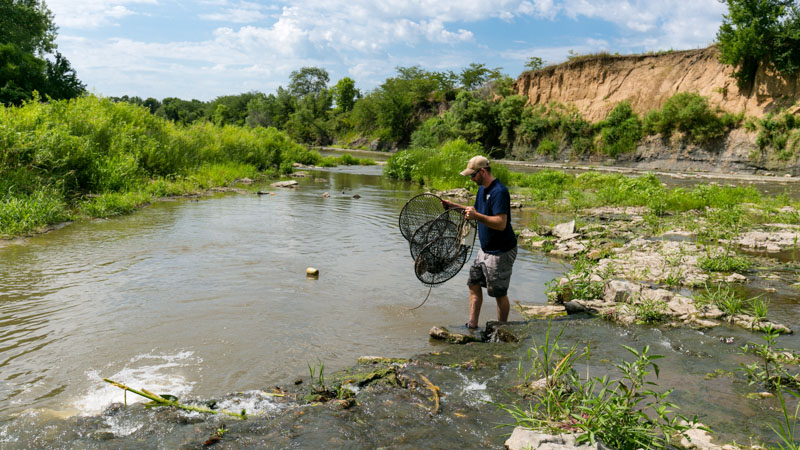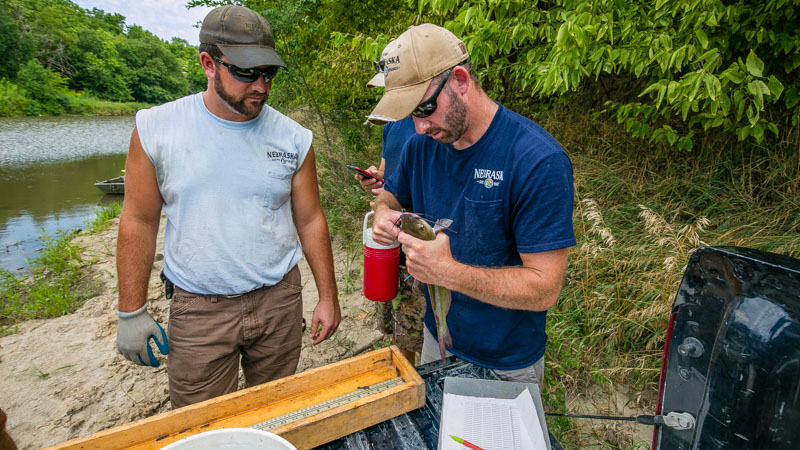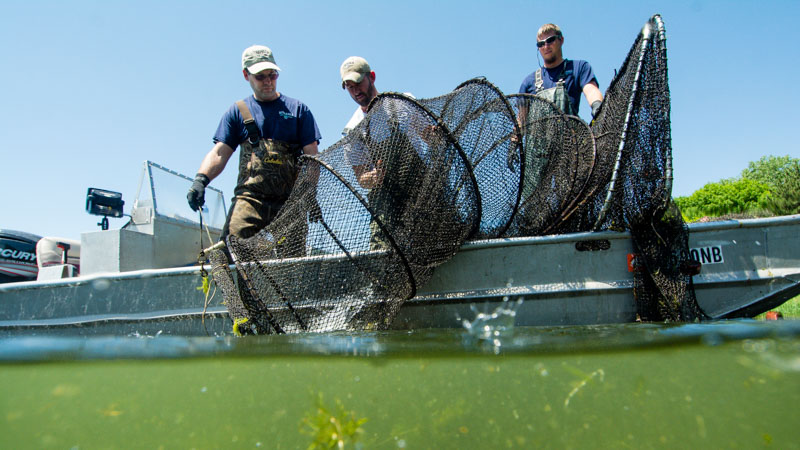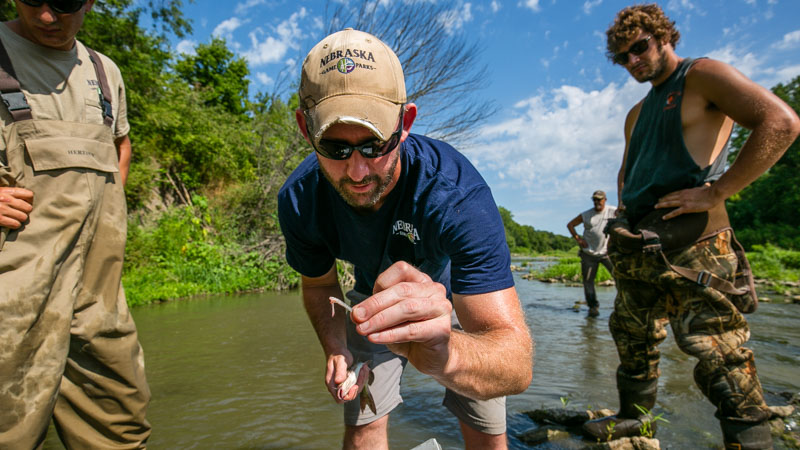Posted: 4/16/2025
SNR Alumni: Barada named 2025 Distinguished Service Alumni

By Ronica Stromberg
Twenty years ago as an undergraduate student, Tony Barada helped organize the annual Wildlife Club Banquet held in the School of Natural Resources to award outstanding members and others. This spring, he returned to what is now the entire school's banquet and received his own award as the 2025 Distinguished Service Alumni.
An alumnus with both his bachelor's and master's degrees from the University of Nebraska–Lincoln, Barada heads the Fish Division of Nebraska Game and Parks Commission. He leads teams across the state in managing the fisheries that stock Nebraska lakes, setting regulations and performing research to maintain or improve fish habitat. He said he felt surprised and grateful to be named the award winner.
"I was extremely thankful and proud because the school itself meant a lot to me 15- to 20-plus years ago, when I was actually going there, but it has continued to mean a lot to me through the work that we've been doing at Game and Parks and the interactions and the collaborations we've had over time," he said.
He pointed out that the School of Natural Resources and Nebraska Game and Parks Commission have a close bond, with about half of the 59 Fisheries Division’s employees holding one or more University of Nebraska–Lincoln degrees, the vast majority from the School of Natural Resources or its predecessors.

Barada visits the classes of his graduate school advisor, Mark Pegg, to speak to students about work as a fisheries biologist. During fall break, he has trained Pegg’s students on collecting fish and processing samples. He estimated the Fisheries Division hires 6 to 12 students or recent graduates in the summer as seasonal or temporary help.
In turn, Pegg and other university professors provide expertise and labor on Game and Parks projects. Barada said the collaboration between the school and agency has been fulfilling and fun. Pegg nominated Barada for the alumni award.
"Tony works hard in silence and let’s his success be his noise,” Pegg said at the banquet.
When Barada speaks to students, he said he relays the importance of gaining experience in the field or professors' labs. A favorite story he tells to temporary or seasonal staff is of his first job working with his undergraduate advisor, Ed Peters, on a sturgeon project. Researchers wanted to compare what food the Platte River offered sturgeon with what the fish actually ate. They collected river water and drift in large, commercial mayonnaise jars. Between classes, Barada worked in the lab, emptying the jars and sifting through the detritus for insects, invertebrates and small fish.
"At the time, I was like, 'This is pretty cool. I know the entire process that's going on,'" he said.
Later, he was able to go out and net fish to have their stomach contents examined. He said the lab work further bred his curiosity and excitement about the field and he now sees how his university experience paid off.

"That was probably the biggest thing, being involved in a lab from the get-go and just being included in the science process," he said.
After graduating in 2004, he stayed at the university another year on soft funds to finish a statewide stream inventory. He then went to Game and Parks to work on another grant with the Missouri River program. He applied for permanent positions, but unable to get one, he returned to the university in 2007 to earn his master’s in natural resources.
He had realized, he said, that a graduate degree could make him a more competitive candidate for natural resources jobs. Now part of hiring at Game and Parks, he shares this information with others struggling to get a permanent position.
"That's a message that I've typically tried to share with folks is, 'If this continues to happen, and you know you have a passion for what you want to do, here's the next step,'" he said. "And the next step and what I told myself was, 'I'm going to go to graduate school. I'm going to get continued education and training and experience in this field.'"
Once he had earned his master's degree, he worked at the university another year as a project coordinator in the Nebraska Cooperative Fish and Wildlife Research Unit. He then took a biologist position at Game and Parks, managing the fisheries in the southeast part of the state. He continued moving up at the agency and has now served as the administrator of the Fisheries Division for about two months.
Nebraska has more than 400 lakes or reservoirs and thousands of miles of rivers and streams that Barada's team works on. Barada said some of his proudest accomplishments have been working with his team to improve water bodies that have not lived up to their potential.
"To take a water body that is not providing much of a fishing opportunity and to flip that around to create a phenomenal fishery really drives me," he said. "Our actions to improve water quality and aquatic habitat so that people are drawn to that place and have positive outcomes with their fishing adventures, their camping outings or other recreational experiences takes a huge team effort, and that's what I'm most proud of in our work."
He said his ambition over the next 20 or more years of his career is to continue working at the Nebraska Game and Parks Commission to enhance and conserve the state's natural resources and aquatic systems.
"The position that I'm in now is really the landing spot for me," he said. "It was something that I had in my mind early in my career but never knew if it would ever be attainable. So, my goals and ambitions are to continue building on and improving what my predecessors and the Game and Parks team have built to this point."
